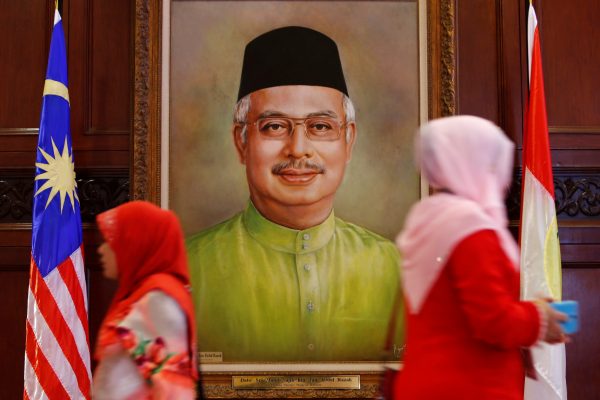Najib would certainly be pleased with the personal deal he struck with Abdul Hadi Awang, the leader of Parti Islam Malaysia (PAS). Under Hadi, PAS has refused to join the PH, citing the omnipresent influence of the Chinese-based Democratic Action Party (DAP). Hadi claims that the DAP’s secret agenda is to stop the creation of an Islamic state and to promote Christianity. While this may be a real fear in the Malay community, the more tangible reason is Hadi’s personal disgust with Mahathir for successfully oppressing PAS’s political agenda when he was in power.
Najib on the other hand is playing along nicely with Hadi. Najib has promised Hadi that the United Malays Nationals Organisation (UMNO) (head of the ruling political coalition) will support RUU 355 — an amendment to increase judicial penalties under Sharia Law. Most legal experts believe that once RUU 355 is passed by parliament, it will be the first step in altering Malaysia’s largely secular federal constitution. The unwritten deal between Hadi and Najib is that once Najib wins the general election, UMNO will adopt RUU 355 as a government bill.
If the deal holds, PAS will field as many candidates as it can against UMNO in the 110–20 largely rural Malay-majority seats. While on the outset this looks terrible for Najib, it must be understood in the context of Mahathir’s PH also going after these Malay seats. It is impossible to win a general election in Malaysia without winning a large proportion of Malay seats.
Malaysia operates under a first-past-the-post electoral system, so with the opposition vote split between PAS and PH, UMNO will win the bulk of the Malay seats and will therefore win the general election. Najib is so confident of this strategy that he has told his inner circles that UMNO is aiming to take 140–160 seats in the 222-seat parliament.
By contrast, without the powers of patronage and the government machinery, opposition leader Mahathir is finding it increasingly difficult to influence the electorate. Mahathir’s problem is his strongman legacy. Many in the middle-class and the opposition want him to apologise for human rights abuses during his 22 years in power, including the jailing of opposition leaders under the infamous Internal Security Act. Mahathir has steadfastly refused to do so and merely said he ‘regrets’ some of his actions.
There is a sense among urban voters that Mahathir cannot be trusted and is only using the opposition to capture power. Some fear that once in power, he will revert back to his authoritarian ways. Hence, there is a real danger that educated, urban voters will protest Mahathir’s recalcitrance by simply staying at home during the general election rather than voting for the opposition, which indirectly helps Najib.
The 1MDB scandal also does not appear to have gained political traction. Despite the best efforts of the opposition to paint Najib as a kleptocrat and an international pariah, Najib managed to meet US President Donald Trump in the White House. Najib even had the nerve to tell Trump that Malaysia was going to ‘make America great again’ by investing more than US$20 billion in the United States.
Immediately after Washington, Najib flew to London to meet British Prime Minister Theresa May. The photo ops with Trump and May effectively numbed the opposition’s propaganda campaigns in Malay rural areas.
Najib also blunted the opposition’s claim that Saudi Arabia was unhappy with Najib for implicating the Saudis in 1MDB by hosting King Salman in Malaysia. Najib even took King Salman’s first selfie and the Saudis promised investments in Malaysia worth US$7 billion.
Najib’s one weak point is the economy — in particular the strength of the Malaysian ringgit (RM), which has lost more than 20 per cent of its value since he came to power. But the business community is slowing getting used to the weakened ringgit: the exchange rate is not expected to go back to RM3 to US$1 any time soon, and most people will tolerate the ringgit at its current level of roughly RM4 to US$1.
Najib has cleverly used the 2018 budget to channel aid to more than seven million Malaysians in the bottom 40 per cent of the population using cash transfers and individual tax cuts. The 1.5 million-strong civil service will get additional days off, unrecorded leave for umrah pilgrimage and easier promotions.
By the end of the year, Najib will be politically stronger. His deal with PAS has effectively blindsided Mahathir and PH, and the 1MBD corruption allegations are by and large considered ‘old news’ by the all-important rural Malay electorate.
Going forward, the only danger facing Najib is Hadi’s health. Hadi has suffered several heart attacks and there is a possibility that a fatal heart attack could occur anytime. If he dies, PAS will split and Najib may not be able to hold the new PAS leaders to the deal made with Hadi.
As long as Hadi lives until the next general election, Najib’s political status and reputation as Malaysia’s Teflon prime minister is assured.
James Chin is Director of the Asia Institute at the University of Tasmania.
This article is part of an EAF special feature series on 2017 in review and the year ahead.

